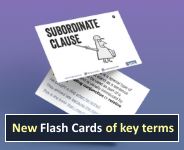Topic: Verb
Verbs are a very important word class, including words for actions (he walked home) and states (she is at home). They can be marked for present or past tense (walks, walked).
- « first
- ‹ previous
- 1
- 2
- 3
Englicious contains many resources for English language in schools, but the vast majority of them require you to register and log in first. For more information, see What is Englicious?

